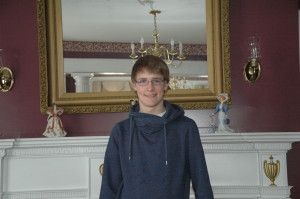 Andreas Meyer-Giesow says it’s the little things that are different.
Andreas Meyer-Giesow says it’s the little things that are different.
The well-mannered 17-year-old exchange student says that fundamentally, life in the United States isn’t dissimilar from life in his native Germany. There are, however, some minor differences.
The cars we drive and the homes we live in are different, skyscrapers are much more abundant in New York than Munich, nobody plays football or baseball in Germany, and cloves loosely translates to carnations in Germany, which has made for at least one confusing moment in the kitchen.
“It’s the little things,” Meyer-Giesow said. “I think that’s the difference between being a tourist and living here. Living here you notice things.”
Meyer-Giesow, known affectionately as Andy by his peers (it’s Andi in Germany; just another minor difference), has been living with Francis and Cheryl Putorti since August and has been attending Whitehall High School since September.
“My father was an exchange student in the United States during the 1980s and said it was a great experience for him,” Meyer-Giesow said. “And he was right. It has been a great experience for me. I have a great host family and I’m having a good time.”
He said he had considered studying abroad in a few countries, such as Australia, but ultimately decided to come to America because of his father’s experience here. The fact that before August he had never visited the United States was also a factor.
He has yet to regret his decision.
Meyer-Giesow is from Neubiberg, Germany, a suburb of Munich, and said one of the biggest adjustments to life here was getting used to the size difference.
“I’m used to being near a big city. I can get to the city center in 20 minutes to get the things I need, so that has been new to me. It would be boring if it was the same,” he said.
Although most of the classes Meyer-Giesow has taken at Whitehall have been similar to those he took in Germany, there are some fundamental differences in the way our education system is structured.
Although the German school year is 180 days long, nearly the same as year, the year is scheduled differently.
Students go to school through July but have longer and more frequent vacations. Instead of a week for Christmas break, they get two weeks in Germany.
Another fundamental difference is some towns in Germany will have three different schools for students who are all the same age.
After a few years of what we would consider elementary school, students are split up and sent to schools based on their abilities and don’t have as much freedom to select their classes. Meyer-Giesow, who will be a junior in high school when he returns to Germany this summer, attends the highest level school in terms of academic rigor.
“It’s very theoretical and prepares you for college,” he said.
Extra-curricular activities are also very different. Because there may be three schools in a community, the town organizes sports teams and music classes for students. Such activities don’t count for credit and are done almost exclusively during one’s free time from school.
Meyer-Giesow, a volleyball player in Germany, said soccer is his country’s most popular sport and no one plays football or baseball.
During his time here, Meyer-Giesow has lived the life of a busy American teen. He’s been a member of the cross-country and indoor track teams, experiences he said “went well,” and plans to compete for the track team this spring.
He’s a member of the school’s jazz band and will be in the drama club’s production of “Thoroughly Modern Millie” later this month, a role for which he’s learned several lines of Mandarin, a form of Chinese.
Meyer-Giesow has also had the chance to visit New York City, which he described as “impressive,” as well as Boston and Washington D.C.
“He and Francis walked the Washington Mall from the Lincoln monument to the Washington monument in two-and-a-half hours,” Cheryl Putorti said.
Another trip, possibly to Las Vegas with side trips to the Hoover Dam and the Grand Canyon, are being considered for spring break.
He even went ice fishing, something he said they don’t do in Germany but which he found fun.
“The time is really going fast,” he said.
The oldest of three children, Meyer-Giesow, said he hasn’t felt homesick.
“There’s been no time for being homesick,” he said.
He talks with his family via Skype about once a week and even plays video games with his friends online.
“I think with the internet, it makes it easier,” Putorti said.
The one thing he has missed is beer. He said the legal drinking age in Germany is 16 and they don’t have the problems with binge drinking and drunk driving like we do in America. Although he says Cheryl is a great cook, he has missed German food. He said he recently ate at a German restaurant and he gave his meal less than glowing reviews.
Meyer-Giesow, who will participate in Whitehall’s graduation ceremonies in June and hopes to one day become an engineer, didn’t rule out returning to the United States for a semester abroad when he’s in college.
“Anybody who is thinking about studying abroad, I would encourage them to do it,” he said.



